|
|
| RHP |
South African
River Health Programme
|
State of the Rivers Report
uMngeni River and Neighbouring Rivers and Streams
|
FISH OF THE UMNGENI RIVER
|
|
The uMngeni River boasts 48 species of freshwater (FW) fish (36 indigenous and 12 alien), listed here. A further 57 species are found in the estuary that do not come into fresh water. These have not been shown here.
|
|
Common Name
riverbeam
longspine glassy
Natal mountain catfish
African mottled eel
Madagascar mottled eel
longfin eel Anguilla
Natal topminnow
freshwater goby
chubbyhead barb
redtail barb
straightfin barb
bowstripe barb
duckbill sleeps
goldfish
sharptooth catfish
grass carp
carp
dusky sleeper
blackthroat goby
tropical sand-goby
mosquitofish
estuarine roundherring
sleepy goby
river goby
tank goby
golden sleeper
scaly/KZN yellowfish
bluegill
river snapper
opossum pipefish
freshwater pipefish
smallmouth bass
spotted bass
largemouth bass
Natal moony
Cape moony
flathead mullet
freshwater mullet
rainbow trout
Mozambique tilapia
guppy
southern mouthbrooder
checked goby
brown trout
bearded eelby
redbreast tilapia
banded tilapia
swordtail |
Species Names (# means alien)
Acanthopagrus berda
Ambassis productus
Amphilius natalensis
Anguilla bengalensis labiata
Anguilla marmorata
Anguilla mossambica
Aplochilichthys myaposae
Awaous aeneofuscus
Barbus anoplus
Barbus gurneyi
Barbus paludinosus
Barbus viviporus
Butis butis
Carassius auratus #
Clarias gariepinus
Ctenopharyngodon idella #
Cyprinus carpio #
Eleotris fusca
Favonigobius melanobrachus
Favonigobius reichei
Gambusia affinis #
Gilchristella aestuaria
Glossogobius biocellatus
Glossogobius callidus
Glossogobius giuris
Hypseleotris cyprinoids
Labeobarbus natalensis
Lepomis macrochirus #
Lutjanus argentimaculatus
Microphis brachyurus
Microphis fluviatilis
Micropterus dolomieu #
Micropterus punctulatus #
Micropterus salmoides #
Monodactylus argenteus
Monodactylus falciformis
Mugil cephalus
Myxus capensis
Oncorhynchus mykiss #
Oreochromis mossambicus
Poecilia reticulata #
Pseudocrenilabrus philander
Redigobius dewaali
Salmo trutta #
Taenioides jacksoni
Tilapia rendalli
Tilapia sparrmanii
Xiphophorus helleri # |
Notes
FW/estuarine
FW/estuarine
FW/estuarine
FW/estuarine Red Data
FW/estuarine Red Data
FW/estuarine
FW/estuarine Red Data
Red Data
FW/estuarine
FW/estuarine
FW/estuarine
FW/estuarine
FW/estuarine
FW/estuarine Red Data
Red Data
FW/estuarine Red Data
|

Checked goby
|

Golden sleeper
|

Freshwater mullet
|
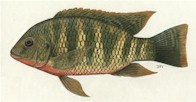
Redbreast tilapia
|
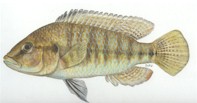
Southern mouthbrooder
|

Bowstripe barb
|

Natal mountain catfish
|
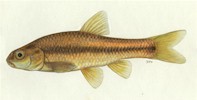
Chubbyhead barb
|
|
INDIGENOUS FISH OF THE UMNGENI RIVER
|
|
Some of the more interesting species include:
|
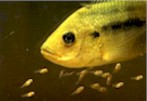
Mozambique tilapia
|

KZN yellowfish
|

KZN yellowfish jump a weir
|
|
The longfin eel is the most common eel found in this river system. Eels breed at sea and juveniles migrate up rivers, even climbing waterfalls and dam walls.
The scaly, nowadays much sought-after by flyfishersmen and the redtail barb are endemic to KwaZulu-Natal, i.e. found only in this province.
The Natal mountain catfish, a small scaleless species normally associated with mountain foothill streams.
The flathead mullet and freshwater mullet (endemic) are common in fresh waters near the coast and occur up as far as Inanda Dam.
Four tilapia species are found in the uMngeni system. The redbreast tilapia has been translocated from the Pongolo system into farm dams, where it has a valuable impact on over-abundant water weeds. The Mozambique tilapia, the banded tilapia and the southern mouthbrooder occur naturally in the uMngeni system.
The golden sleeper is an attractive and scarce species found in a few streams near the mouth of the uMngeni, but not in the main river.
There are five scarce goby species and one scarce eleotrid species found in the estuary area. All are small and lack colour and so are not very noticeable. Of these, the bearded eelgoby lives in burrows in soft mud and is endemic to KwaZulu-Natal.
Exotic fish populations abound and in some cases threaten indigenous fish populations. Fortunately most of the exotic fish are best suited to living in the dams in the region where their impact cannot be considered as serious. Bass in particular are voracious predators in dams and sometimes in rivers. Trout also thrive in the dams and in the upper reaches of the uMngeni River where their impact is varied and the subject of controversy.
|
|
The uMngeni River and its bigger tributaries have indigenous and introduced fish species and thus offer a range of options to fishermen.
Trout angling is popular in the headwaters and has been since around 1895 when the first trout hatchery was built near Belgowan. Midmar Dam catches include barbel, carp and the KZN yellowfish during spring.
|
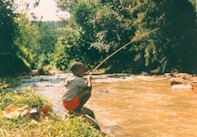
|
Between Howick Falls and Albert Falls Dam, the river is rocky with fast flowing water - ideal habitat for the KZN yellowfish which is also a popular catch here. The Albert Falls Dam itself is an excellent angling venue. While the fish species are much the same as in the Midmar Dam, the warmer water and abundance of submerged trees result in greater growth and the capture of more trophy size specimens.
|
|
Downstream of Albert Falls, the river is well known for its carp but further downstream the KZN yellowfish and catfish are popular to both recreational and subsistence fishermen. Nagle Dam provides good catches of carp, tilapia and catfish, but neither Nagle or Inanda Dam are considered prime fishing venues.
Blue Lagoon, with its additional saltwater species, was historically a hive of fishing activity, but deterioration in river health and siltation of the estuary led to a decline in the angling. However, recently, the estuary has seen a resurgence in angling popularity. Light tackle anglers in particular are now common here and catch a variety of species such as kingfish, springer, and gurnards. These are all marine fish but hopefully this indicates that the estuary is once again becoming a nursery for many fish species.
|
|